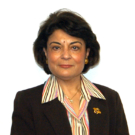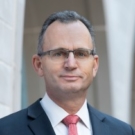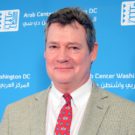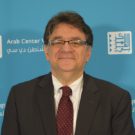Speakers

Rend Al-Rahim
Co-founder and President
Iraq Foundation

Stephen McInerney
Executive Director
Project on Middle East Democracy

Paul Salem
Senior Vice President for Policy Research and Programs
The Middle East Institute
Moderator
Arab Elections and Democracy: Between Authoritarianism, Conflict, and Sectarianism
A closer look at Egypt, Iraq, Lebanon, and Tunisia
Event Summary
Washington, D.C.—May 30, 2018—Over the last few months, four Arab countries––Egypt, Iraq, Lebanon, and Tunisia––held presidential, parliamentary, and municipal elections. Arab Center Washington DC (ACW) convened a panel to discuss elections in the Arab world and whether they represent a true indicator of political change. Panelists included Stephen McInerney from the Project on Middle East Democracy, Paul Salem from the Middle East Institute, Rend Al-Rahim from the Iraq Foundation, and Charles Dunne, nonresident fellow at Arab Center Washington DC. ACW Executive Director Khalil Jahshan provided introductory remarks and Daniel Brumberg, ACW nonresident senior fellow and Georgetown University professor moderated the event.
“Since the so-called Arab Spring… the prospect for elections meaning something more than either an avenue of sectarian conflict or an arena for maintaining autocracy … has emerged” – Daniel Brumberg, ACW
McInerney discussed Egypt’s presidential election last March, noting that it was the least competitive of the four, with President Abdel-Fattah el-Sisi winning another four-year term. Nevertheless, McInerney found that holding the election was politically important because it showed that there were many challengers to the incumbent, most notably from ex-military officers like Sami Anan and Ahmed Shafik. Even though neither was on the final ballot, McInerney said “neither would have [stood for the election] without some significant backing from the military establishment and from within the regime itself. That was widely understood as revealing some splits within the regime to a degree that was, maybe, not widely understood.” The results, as expected, saw Sisi re-elected by winning 97% of the vote and since then, his government has ruthlessly cracked down on opposition figures and activists. Looking forward, McInerney predicted that Sisi will move to further close any space for dissent to prevent activists from organizing their opposition. Ultimately, “Egypt’s elections,” McInerney said, “don’t represent democratic progress, but rather authoritarian retrenchment.”
“Egypt’s elections don’t represent democratic progress, but rather authoritarian retrenchment” – Stephen McInerney, POMED
Salem was positive about Lebanon’s parliamentary elections, saying that “it was very important that elections were held. This parliament had overstayed its mandate by five years—it had been nine years since the last elections.” He also was impressed that relatively free and fair parliamentary elections were conducted peacefully, especially under Lebanon’s new and confusing electoral law and despite numerous domestic and regional instabilities. In Salem’s view, the new electoral law seemed effective and the results accurately reflected voters’ views of the government. Incumbent President Michel Aoun and his party will ultimately dictate the form of the new government, despite performing worse than expected. His bloc, the Free Patriotic Movement, can align with Hezbollah or Saad Hariri’s Future Movement and still have a majority. Regardless of the makeup of the government, Salem expects Aoun to govern from the center—establishing a broad governing coalition that incorporates most political parties within the government—and operate under a guiding philosophy that seeks to keep from angering Hezbollah and Iran while cultivating good relations with the Gulf states, the United States, and the Europeans. “[Aoun] ran from the right but governs from the center,” as Salem described the president. Salem summarized his remarks by stating that “the…results [in Lebanon] do bring change, but minor change, not major change.”
The election results in Lebanon “do bring change, but minor change, not major change” – Paul Salem, MEI
Al-Rahim recognized that the political situation in Iraq is very similar to that in Lebanon, suffering from sectarianism, corruption, and apathy. She said that despite some doubts about the elections being free and fair, they represent a positive trend in Iraq’s political system. Elections have consistently been held on time since 2003, they are usually competitive, and they tend to be inclusive. Overall, Al-Rahim described the elections as a “pointer toward democratic transition,” saying that “the elections have been a good indicator of the democratic evolution and where the country is headed.” Unlike in Lebanon, Al-Rahim explained, there was a great deal of change in Iraq’s parliament, because “there is a mood in [Iraq] that ‘we have not gained by sectarian politics, we have elected sectarian politicians time and time again.’ Not only have they not served the country, they have not served the citizens that belong to that sect.” Voters opted for candidates who are outside traditional sectarian politics, ousting some two-thirds of incumbent members of parliament. To illustrate just how much has changed in Iraqi politics, Al-Rahim noted that Iraqi firebrand Moqtada Sadr “has come a long way in his thinking about the politics of Iraq…he no longer uses a Shia sectarian rhetoric.”
The Iraqi elections are “a good indicator of the democratic evolution and where the country is headed … a pointer toward democratic transition” – Rend Al-Rahim, Iraq Foundation
Finally, Dunne explained that Tunisia has undoubtedly made progress in the years following the ouster of its former dictator. However, he noted, there are serious issues with corruption, the transitional justice efforts that were initiated in the early stages of the post-Ben Ali era are stalled, and civilians’ civil liberties are being violated. Against this backdrop, Tunisia’s recent municipal elections were important both as an exercise in the decentralization of power away from Tunis and as a mechanism for Tunisians to air their grievances with the national government and political elites. Despite low voter turnout—a trend that is not unique to Tunisia—the sheer number of Tunisians who stood for election in municipalities across the country was emblematic of the desire of the citizens to wrestle some authority away from the central government and promote accountability in governance. Dunne noted that “57,000 candidates throughout the country stood for 7,000 municipal offices in 350 municipalities. This is a huge increase” If for no other reason than the exponential increase in political engagement, the municipal elections were clearly successful examples of progress for Tunisia’s democratic transition.
Tunisia’s municipal elections represent a “major step in the democratic transition in Tunisia by starting the process of shifting real responsibility to the municipalities and the regions…and creating a more accountable government” – Charles Dunne, ACW
Event Highlights
Event Photos


